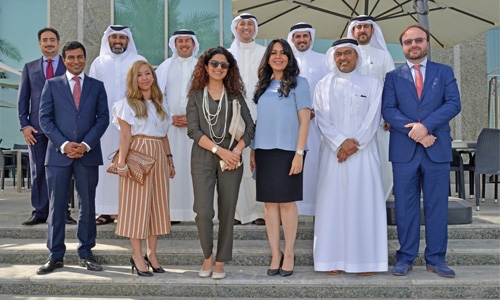Impact of oil price on biz environment discussed
Manama : Falak Consulting, a leading Bahrain-based management consulting firm specialised in empowering organisations to be results driven, invited prominent business leaders to its second quarterly Falak Power Lunch, 2016 for a discussion on measures being taken to steer investments in various sectors and thereby bolster Bahrain’s growth story.
The guest of honour at this event was Economic Development Board CEO Khalid Al Rumaihi. The event took place at the Al Fayez Restaurant in Reef Island here.
Also present at the event were, Alia Almoayed (Nutritional Therapist), Deena Al Ansari (MD – Al-Ansari Lights), Amin Al Arrayed (CEO - First Bahrain), Basim Al-Saie (MD - INSTALLUX GULF), Hisham Al-Saie (CIO – Premier Group), Shaikh Khalid M Al Khalifa (CEO – Palm Capital), Khalid Al Quod (MD – AlQuod Consultancy), Jean-Baptiste Lucas (CEO – GARMCO) and Shahd Al-Zaki (Creative Director - MIEVENTO creative hub). Representing Falak Consulting were the CEO, Suhail Algosaibi and Executive Director, Jitender Shekhawat.
Commenting on the Falak Power Lunch, Algosaibi said: “The idea behind Falak Power Lunch is to provide top business leaders in Bahrain with a platform to meet and engage in a free exchange of ideas, share concerns and examine ways to further strengthen Bahrain’s commercial advantages and bring in investments. The Falak Power Lunch is held every quarter and has proved to be a huge success since its launch.”
The discussions revolved around the impact of the oil prices on the business environment, the effect on the overall economy of the BD32 billion worth projects planned over the next seven years, the general flow of contracts awarded, and how mindsets need to change in order to battle negative sentiments around perceived slowdown.
The Economic Development Board has already identified five core sectors for growth and investments: financial services, manufacturing, logistics, tourism and leisure, and information, communications and technology.
Commenting further on EDB’s mandate to steer Bahrain towards emerging as an investor-friendly nation, Al Rumaihi said: “The role of the EDB is focused on economic planning, encouraging local and international investments and policy advocacy. However, the key questions we ask while assessing the cash flow is - what do we need investments for? And then, what is the value proposition for investors? We have already identified five core sectors where we expect both growth and investments, and hence, a more targeted approach is adopted to each of the sectors.”
EDB-Bahrain has introduced KPIs to track investment activity in these sectors, and these KPIs put the spotlight on how much foreign direct investment has been achieved, how many projects have been finalised, how much employment will be generated through these projects, and whether or not people perform their functions in a timely manner.
Al Rumaihi added that for any development to achieve success, infrastructure is not always an issue but logistics holds the key. The Bahrain Logistics Board, for example, has been set up to reduce waiting time at the causeway through quicker processes. The causeway sees an ongoing traffic of both goods and people, and if these processes can be tackled smoothly it will have positive impact on business.
Related Posts

